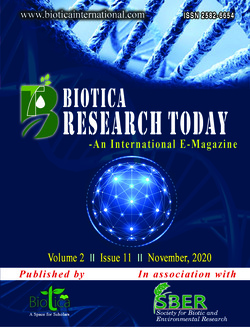
Physiological Factors of Dry Land Crop Production
S. Alagappan
Dept. of Agronomy, The Indian Agriculture College (Affiliated to the Tamil Nadu Agricultural University), Radhapuram, Tamil Nadu (627 111), India
DOI: NIL
Keywords: Antitranspirants, Effect on nutrient uptake, Photosynthesis, Stomatal mechanism and yield
Abstract
Soil moisture is the most limiting factor in dry land farming. Understanding the physiological processes that occur during moisture stress is necessary to ameliorate the stress effects either by management practices or by plant improvement. The major physiological principles that affect dry land crops are as follows: Soil moisture stress, Effect on photosynthesis, Assimilate saturation, Respiration, Metabolic reaction, Hormonal relationships, Growth and Leaf area development and reproduction and yield.
Downloads
not found
Reference
Anjum, S. A., Wang, L. C., Farooq, M., Hussain, M., Xue, L. L., and Zou, C. M., 2011. Brassinolide application improves the drought tolerance in maize through modulation of enzymatic antioxidants and leaf gas exchange. J. Agron. Crop Sci. 197: 177–185. doi: 10.1111/j.1439-037X.2010.00459.x.
Ashraf, M., 2010. Inducing drought tolerance in plants: recent advances. Biotechnol. Adv., 28: 169–183. doi: 10.1016/j.biotechadv.2009.11.005.
Lesk, C., Rowhani, P., and Ramankutty, N., 2016. Influence of extreme weather disasters on global crop production. Nature, 529: 84–87. doi: 10.1038/ nature16467
